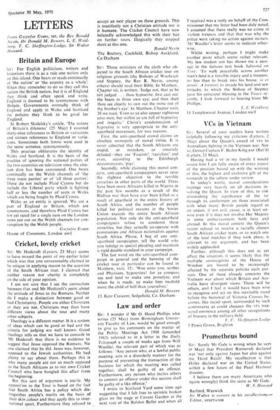Law and order Sir: I wonder if Mr 0. Hood
Phillips who writes (23 May) from Birmingham Univer- sity Faculty of Law, would be good enough to give us his comments on the matter of the Public Meetings Act 1908 (amended 1963) referred to in a letter in the Daily Telegraph a couple of weeks ago from Wilf Wooller, the relevant part of which was as follows: 'Any person who, at a lawful public meeting. acts in a disorderly manner for the purpose of preventing the transaction of the business for which the meeting was called together, shall be guilty of an offence. Furthermore, any person who incites others to commit an offence under this section shall be guilty of a like offence.'
I wrote to Scotland Yard some time ago suggesting that 1 felt free to sprinkle broken glass on the stage at Covent Garden at the next visit of the Bolshoi Ballet and when all I received was a reply on behalf of the Com- missioner that my letter had been duly noted, I assumed that there really was no crime in violent trespass and that that was why the police were taking no action against inciters. Mr Wooller's letter seems to indicate other- wise.
Whilst writing, perhaps I might make another point which seems rather relevant. My law student son has shown me a pass- age in the famous text book Salmond on Tort: 'To walk peacefully across another man's land is a forcible injury and a trespass, no less than to break into his house. vi et ar►ni.s'. A fortiori, to invade his land and sew tintacks, to which the Bishop of Stepney gave his episcopal blessing in the Times re- cently. 1 look forward to hearing from Mr Phillips.


































 Previous page
Previous page